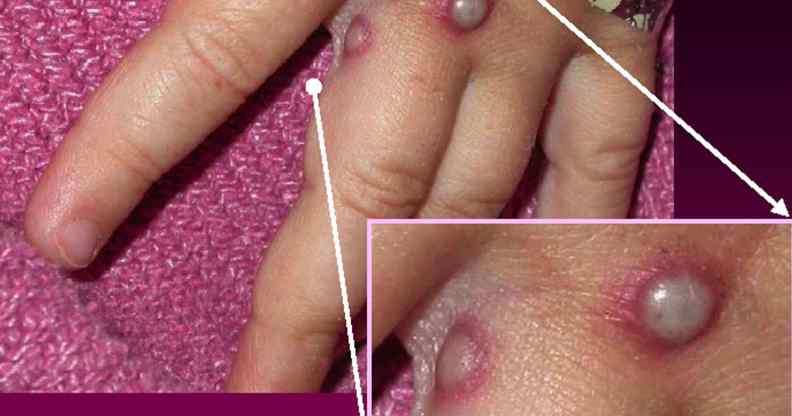Monkeypox to be renamed after scientists urge WHO to combat stigma and discrimination

A coalition of LGBTQ+ organisations have called on the CDC to expand monkeypox testing and rename the virus to reduce stigma. (Photo Courtesy of CDC/Getty Images)
Monkeypox will officially receive a new name from the World Health Organization (WHO).
The announcement came after a group of 30 scientists called for a “speedy decision and adoption of a new name” to combat racist and anti-African stigma around the virus.
WHO currently refers to two ‘clades’ of monkeypox: the West African clade and the Congo Basin (Central African) clade.
The scientists wrote in a statement published 10 June: “The prevailing perception in the international media and scientific literature is that MPXV [monkeypox] is endemic in people in some African countries.
“However, it is well established that nearly all MPXV outbreaks in Africa prior to the 2022 outbreak, have been the result of spillover from animals to humans and only rarely have there been reports of sustained human-to-human transmissions.
They cited “growing evidence” monkeypox has been spreading human-to-human across Europe “for longer than previously thought” as one reason why the current outbreak should not be linked to Africa, explaining that such links are “discriminatory and stigmatising”.
“In the context of the current global outbreak, continued reference to, and nomenclature of this virus being African is not only inaccurate but is also discriminatory and stigmatising.”
The scientists referred to the virus as hMPXV “to denote where we believe this now human virus becomes distinct from MPXV”.
On Tuesday (14 June), WHO’s director general, Tedros Adhanom Ghebreyesus suggested the body had heeded this advice.
He said WHO was “working with partners and experts from around the world on changing the name of monkeypox virus, its clades and the disease it causes,” per TIME.
New names will be announced “as soon as possible”.
WHO previously changed its system for naming COVID variants to combat stigma.
According to the World Health Organization (WHO) there are currently more than 1,600 cases and 1,500 suspected cases of monkeypox reported in 39 countries (as of 14 June), including seven countries where the disease has never been detected.
The UK has detected 470 cases as of 12 June.
"So far this year, more than 1,600 confirmed cases and almost 1,500 suspected cases of #monkeypox have been reported to WHO from 39 countries – including seven countries where monkeypox has been detected for years, and 32 newly-affected countries"-@DrTedros
— World Health Organization (WHO) (@WHO) June 14, 2022
Since monkeypox began spreading in Western countries, discriminatory and racist rhetoric around the virus has been called out by multiple bodies.
The Foreign Press Association, Africa (FPA Africa) even called for global media to stop using images of Black African people when reporting on monkeypox in Europe.
The FPA said: “We condemn the perpetuation of this negative stereotype that assigns calamity to the African race and privilege or immunity to other races.”
We condemn the perpetuation of this negative stereotype that assigns calamity to the African race and privilege or immunity to other races.— The Foreign Press Association, Africa(FPAA). (@FPA_Africa) May 21, 2022
Anti-LGBTQ+ stigma is also being perpetuated around the monkeypox outbreak due to the significant number of queer men diagnosed with the virus.
Some reporting around the virus has been accused of fuelling hate against community.
UNAIDS called out such actions in a statement on 22 May that said: “Public reporting and commentary on Monkeypox has used language and imagery, particularly portrayals of LGBTI and African people, that reinforce homophobic and racist stereotypes and exacerbate stigma.”
Monkeypox can affect anybody, as Mateo Prochazka, an infectious disease epidemiologist with the UKHSA, previously told PInkNews.
“Transmission is not exclusive to gay and bisexual men, it just happens that it has entered this network,” he explained.
In a recent interview with PinkNews, a man who was diagnosed with the virus, James McFadzean, said that it was already being treated as a “gay disease.”
“That is adding to the stigma. Even if you’re not openly saying ‘it’s a gay thing’ the inference is there. ‘Gay people love sex, they have massive orgies every weekend’. They’re playing off that stereotype – it’s not helping people,” he said.

